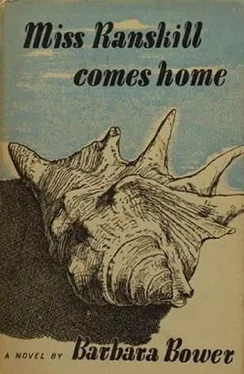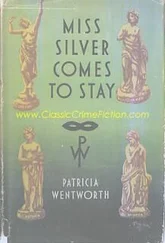She was back in her old home, alone in it, free to love its blemishes – the kicked white paint, the protests of the stairs, the doorstep that must surely hold an even deeper puddle in wet weather now that more footfalls had left memorial on it.
Presently she would get up and make some tea. At nine o’clock Emma, one-time housemaid and now the mother of a growing family, would ‘slip in’ and help ‘Miss Nona’ put things straight after the tenants.
II
Three weeks later, Miss Ranskill awoke suddenly in the dark hours of the morning.
Recently, she had always wakened happily, assured (as when she was a child on Christmas morning) that something lovely had happened, secure in the knowledge that she was home again.
For everything had been going smoothly, and even the inventory had been correct. Lucy Mallison would be coming in a few weeks. Later a friend of hers, who had one small child and was expecting another, would join the party. Miss Ranskill had answered a third advertisement and the reply might come any time.
There would be a Christmas tree in December. There would be socks hung on the ends of cots. The old house, accustomed to children since the days of Queen Anne, would be contented again. Its stairs would respond with little excited creakings to the sound of small footsteps and its echoes would be happy.
The war news was better too. The Allies were heading towards Rome. The triumphant salvoes from the big guns in Russia sounded more frequently now.
There seemed just a hope that the unborn children, soon to be lying in their cradles in the friendly house, might make their first staggering footsteps into the way of peace.
Yet, this morning’s awakening was alarming. She had been dreaming of the island and something had startled her. This time it was not the cry of a gull, winging to the very edge of sleep and hovering on the horizon where dreams merge into wakefulness.
There was something wrong this time. There was a surge of water in her ears. Waves were hurrying towards her, summoning restlessly – ‘Hush! Hush! Hush!’ Those were the little ones shuffling up the shingle. ‘Cr-ash! Cr-ash! Crash!’ She could almost hear the big ones curling before they deafened. ‘Hush! Hush! Hush!’
If only they would hush and give her the chance to listen to whatever it was she ought to hear.
Yet she was awake and she was in bed. Her feet felt the sheets and her ribs were conscious of her right elbow’s pressure. She raised her head from the pillow and the surging died away.
After all, she had only been cupping her ear with her hand. That was all. Her hand had been curved like a sea-shell and she had heard the sea again, as once she had heard it through the shell from the mantelpiece in the Carpenter’s kitchen.
She repeated the experiment. Once more the swirl of waters overpowered her thoughts and again she heard the insistent – ‘Hush! Hush! Hush!’
She closed her eyes, but sleep had been sent away by the water-music.
She thought of Colin, the Carpenter’s son, and wondered if he were in distress. She pictured him standing, barefooted in the little kitchen, pressing the shell to his ear, listening (Hush! Hush! Hush!) for the comfort that only she could bring.
That was nonsense, of course, a silly sentimental idea. The boy would be in bed now and asleep.
If there were such a thing as telepathy, it would not need the invocation of a sea-shell and the hand of a middle-aged woman cupped against her ear.
She switched on the lamp beside her and the clock on the table told her that it was three o’clock.
Could ye not watch with me one hour?
But an hour of watchfulness had nothing to do with Colin . That was the sentence she recalled when the night bombers flew across the house and she remembered the cry of another Carpenter’s son in a dark garden. There were no bombers overhead tonight.
She could hear the rain slushing from the walnut tree, but she had no sense of comfort. As a rule, wild or wet weather added to her happiness, making her realise her bed and the security of walls.
She turned out the light and lay for some time in that state of restless confusement that is not quite sleep and not quite consciousness. Presently, the squalling of a cat drifted her into dreaming.
Colin was running down the village street. A tin-can was tied to his pyjama coat and children with rat-like faces pelted him with sea-shells, crowding and scrabbling, making a Pied Piper of a nightmare.
Now he was in a boat, the boat his father had made. He was baling out water with a sea-shell, but the water was gaining. Waves were rushing over the bows and every wave had a rat’s face. The water was snapping. White teeth and white spray were indistinguishable.
Miss Ranskill shrieked, and this time her own voice awakened her.
Memories of the boy dominated her all the time she was dressing. Certainty of his need took possession of her. She scarcely realised, even, that she had put on her only tidy coat and skirt instead of her gardening clothes.
She was lacing her best shoes when Emma arrived, and she answered the enquiring glance automatically.
‘I’ve just heard I must go away for the day. I shall be back this evening, I expect. Could you lay the fire in the sitting-room, please, Emma.’
‘Yes, Miss. And shall I put the egg ready by the saucepan. That would be as nice as anything for your supper, wouldn’t it?’
‘Yes, two eggs, please. We’ll want something else though when we come in. Don’t let’s bother to arrange now. I can make something. I didn’t know until this morning that I should have to go away.’
A knock sounded on the front door.
‘Postman,’ said Emma, ‘I passed him in the lane. He’s late this morning.’
She went out of the kitchen and returned with an envelope: it was penny-stamped, an unmistakable bill.
‘It’s for Mrs Wilson, Miss. We’ll have to forward it.’
‘Yes.’ Mrs Wilson seemed very far away, as far as the Carpenter’s boy was near. ‘Emma, if you’ve got time, you might make up the bed in the little south room, just in case – I don’t really know yet.’
‘In the little south room?’
‘Yes, please.’
‘Miss Edith never did care much for that little room.’
‘Miss Edith?’
‘It wouldn’t take me long to get her own room ready. We could leave beating the carpet till later if I just gave it a good sweep and washed round the skirting boards. It wouldn’t take all that time–’
The sound of a tinkle interrupted her. The noise was repeated.
‘Didn’t the men come then, Miss?’
‘What men?’
‘The Telephone men. You said they’d promised to come yesterday afternoon to set the wires to rights?’
For all through the wind and rain of yesterday, the telephone bell had kept up a ceaseless tinkling. It was a thing that sometimes happened, so Emma had told Miss Ranskill, when the telephone lines became entangled in the walnut tree. Until they could be disengaged the telephone was useless. It had been useless all yesterday.
‘No,’ said Miss Ranskill slowly, ‘they didn’t come after all.’
She noticed Emma’s bewildered expression, saw how the elderly woman glanced again at the single letter on the table. She had been too well trained by Edith to ask questions, but Miss Ranskill felt sorry that she could not satisfy a curiosity that was born only out of the friendliness that had gathered through long years of service.
But how could she explain the inexplicable and say that what she had heard in the morning had not been learned by written word or over the telephone?
‘I must go now or I’ll miss the train. I’ll leave everything to you, Emma. If you’ll just leave the key in the usual place.’
Читать дальше












